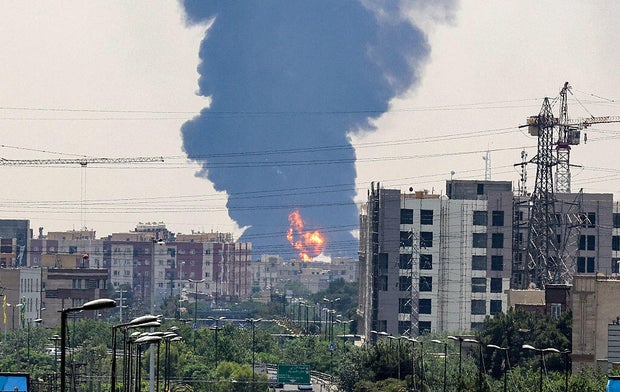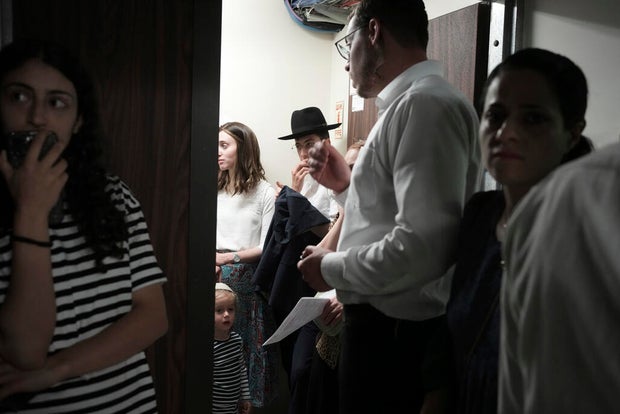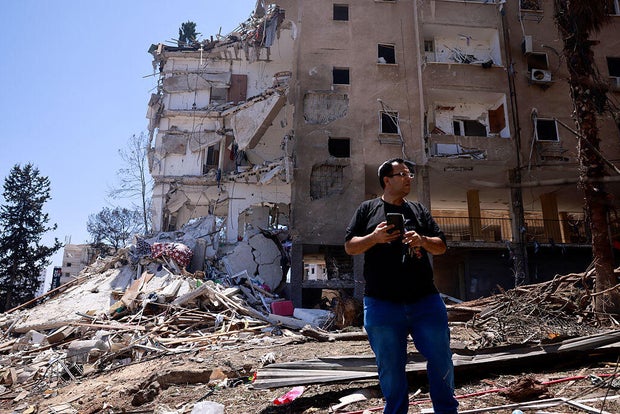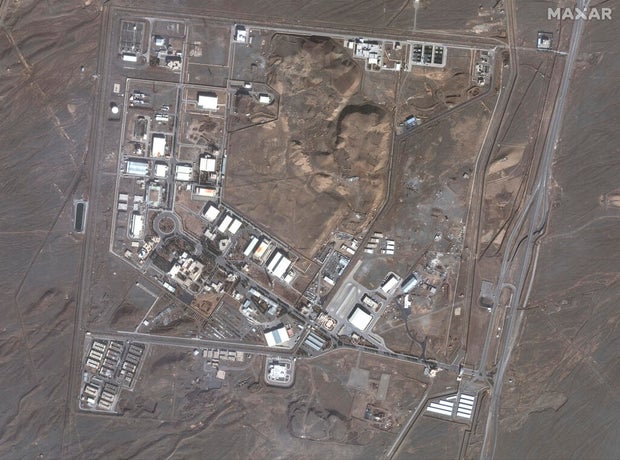Israel unleashed airstrikes across Iran for a third day on Sunday and threatened even greater force. Also Sunday, some Iranian missiles evaded Israel’s air defenses to strike buildings in the heart of the country. The exchange of fire comes as talks on Iran’s nuclear program in Oman between the U.S. and Iran were called off.
The simultaneous strikes represented the latest salvo since a surprise attack by Israel three days earlier aimed at decimating Tehran’s rapidly advancing nuclear program. Iran said Israel struck two oil refineries, raising the prospect of a broader assault on Iran’s heavily sanctioned energy industry that could affect global markets.
The Israeli military, in a social media post, warned Iranians to evacuate arms factories, signaling what could be a further widening of the campaign. Around noon local time, explosions were heard again in the Iranian capital, Tehran.
President Trump has expressed full support for Israel’s actions while warning Iran that it can only avoid further destruction by agreeing to a new nuclear deal.
Iranian Foreign Minister Abbas Araghchi said Sunday that if the Israeli strikes on Iran stop, then “our responses will also stop.” He said the United States “is a partner in these attacks and must take responsibility.”
New explosions echoed across Tehran and were reported elsewhere in the country early Sunday, but there was no update to the death toll released the day before by Iran’s U.S. ambassador, who said 78 people had been killed and more than 320 wounded.
In Israel, at least 10 people were killed in Iranian strikes overnight and into Sunday, according to Israel’s Magen David Adom rescue service. It brought the country’s total death toll to 13, including a 10-year-old and a 9-year-old in Bat Yam, near Tel Aviv, since the strikes began on Friday night.
Iran has fired over 270 missiles, 22 of which made impact, according to official Israeli figures.
Israeli strikes targeted Iran’s Defense Ministry early Sunday after hitting air defenses, military bases and sites associated with its nuclear program. The killing of several top generals and nuclear scientists in targeted strikes indicated that Israeli intelligence has penetrated Iran at the highest levels.
Israel — widely believed to be the only nuclear-armed state in the Middle East — has sophisticated multi-tiered air defenses that are able to detect and intercept missiles fired at populated areas or key infrastructure, but officials acknowledge it is imperfect.
Israel’s defense minister warned Saturday that “Tehran will burn” if Iran continues firing missiles at Israel.
Speaking after an assessment meeting with the army’s chief of staff, Defense Minister Israel Katz said Iran will pay a heavy price for harming Israeli citizens. At least three people have died in Israel, and dozens were wounded, Israel Defense Forces officials said Saturday morning.
“If (Iranian Supreme Leader Ayatollah Ali) Khamenei continues to fire missiles at the Israeli home front — Tehran will burn,” Katz said.
Following Israel’s expanded assault, Katz followed up early Sunday morning with a post that read, “Tehran is burning.”
Urgent calls to de-escalate
Prime Minister Benjamin Netanyahu, who has made the destruction of Iran’s nuclear program his top priority, brushed off urgent calls from world leaders to de-escalate, saying Israel’s strikes so far are “nothing compared to what they will feel under the sway of our forces in the coming days.”
Israel’s initial assault used warplanes — as well as drones smuggled into the country in advance, according to officials — to hit key facilities and kill top generals and scientists.
“The individuals who were eliminated played a central part of the progress toward nuclear weapons,” the IDF said in a news release. “Their elimination represents a significant blow to the Iranian regime’s ability to acquire weapons of mass destruction.”
Iran retaliated by launching waves of drones and ballistic missiles at Israel, where explosions lit the night skies over Jerusalem and Tel Aviv and shook the buildings below. The Israeli military urged civilians, already rattled by 20 months of war in Gaza sparked by Hamas’ Oct. 7 attack, to head to shelter for hours. U.S. officials confirmed to CBS News that U.S. forces helped Israel intercept Iranian missiles on Friday.
Iran calls nuclear talks “unjustifiable”
Israel’s ongoing strikes have halted — for now — diplomacy between the U.S. and Iran. Oman’s foreign minister, Badr al-Busaidi, said on social media that talks on Sunday “will not now take place,” but he added that “diplomacy and dialogue remain the only pathway to lasting peace.”
A senior administration official told CBS News, “While there will be no meeting Sunday, we remain committed to talks and hope the Iranians will come to the table soon.”
Araghchi, Iran’s foreign minister, said Saturday that the nuclear talks were “unjustifiable” after Israel’s strikes, which he said were the “result of the direct support by Washington.”
In a post on his Truth Social account early Sunday, Mr. Trump reiterated that the U.S. was not involved in the attacks on Iran and warned that any retaliation directed against it would bring an American response “at levels never seen before.”
“However, we can easily get a deal done between Iran and Israel, and end this bloody conflict!!!” he wrote.
Above-ground section of Natanz facility destroyed
Among the key sites Israel attacked was Iran’s main nuclear enrichment facility in Natanz, where black smoke could be seen rising into the air. It also appeared to strike a second, smaller nuclear enrichment facility in Fordo, about 60 miles southeast of Tehran, according to an Iranian news outlet close to the government that reported hearing explosions nearby.
Israel said it also struck a nuclear research facility in Isfahan, and said it destroyed dozens of radar installations and surface-to-air missile launchers in western Iran. Iran confirmed the strike at Isfahan.
U.N. nuclear chief Rafael Grossi told the Security Council that the above-ground section of the Natanz facility was destroyed. The main centrifuge facility underground did not appear to have been hit, but the loss of power could have damaged the infrastructure there, he said.
Israel also struck a nuclear research facility in Isfahan. The International Atomic Energy Agency said four “critical buildings” were damaged, including its uranium conversion facility. It said there was no sign of increased radiation at Natanz or Isfahan.
An Israeli military official, speaking on condition of anonymity in line with official procedures, said that according to the army’s initial assessment, “it will take much more than a few weeks” for Iran to repair the damage to the Natanz and Isfahan nuclear sites. The official said the army had “concrete intelligence that production in Isfahan was for military purposes.”




